| dc.contributor.advisor | Thengs, Kjetil V. | |
| dc.contributor.author | Berge, Marcel | |
| dc.coverage.spatial | Norway | nb_NO |
| dc.date.accessioned | 2016-08-22T13:45:02Z | |
| dc.date.available | 2016-08-22T13:45:02Z | |
| dc.date.issued | 2016-05 | |
| dc.identifier.uri | http://hdl.handle.net/11250/2400470 | |
| dc.description | Master's thesis in Literacy studies | nb_NO |
| dc.description.abstract | This thesis presents a comparative case study on the effects of an All English teaching programme on the oral English proficiency of 12-13-year-old Norwegian learners of English as a foreign language. By ‘All English’, it is here meant that the teacher spoke the target language exclusively in all English lessons. The study is based on the experience gained from two 7th grade classes of Norwegian pupils in the county of Rogaland, where one class of 21 pupils was used as an experimental group and another class of equal size was used as a control group. The teacher in the control group used the L1 approximately 45 percent of the instruction time.
Two main views on this topic are present in the research field of FL didactics. On one hand, Cook (2001) argues for a reinstatement of the L1 as a helpful teaching tool in the FL classroom. On the other, Krashen (1982) claims that the TL should be used as much as possible in the FL lessons to ensure the highest possible amount of TL input for the learners. Both of these views have several supporters.
Structured interviews were used to measure the pupils’ change in four oral proficiency variables: the length of their answers in reply to open questions, their use of different verbs and auxiliaries and their reliance on the L1 during FL speech. Questionnaires were used to measure the pupils’ changes in attitudes towards their own FL proficiency as well as their attitudes towards the usefulness and enjoyment of the FL lessons.
Judging from the study, the pupils exposed to the All English programme did in fact benefit from it, both in terms of oral proficiency and in their attitudes towards their FL proficiency and the FL lessons. On the measurements of oral proficiency, all of the pupils in the class showed significant improvement in the length of their answers to open questions as well as a greatly increased verb vocabulary. The programme had little effect on the pupils’ use of auxiliaries and their use of the L1 in FL speech.
When looking at attitudes and confidence, the lower proficiency pupils (step 1) appeared to benefit the most from the programme by significantly increasing their confidence towards their own FL proficiency, as well as their attitudes towards the FL lessons and how useful they found these lessons. This thesis concludes that FL teachers should strive towards a maximized use of the TL during all FL lessons in order to increase the amount of TL input and thereby improve the chance for language acquisition to occur. | nb_NO |
| dc.language.iso | eng | nb_NO |
| dc.publisher | University of Stavanger, Norway | nb_NO |
| dc.relation.ispartofseries | Masteroppgave/UIS-HF-IKS/2016; | |
| dc.subject | L1 use in FL teaching | nb_NO |
| dc.subject | action research | nb_NO |
| dc.subject | all English programme | nb_NO |
| dc.subject | young EFL learners | nb_NO |
| dc.subject | engelskopplæring | nb_NO |
| dc.subject | lesevitenskap | nb_NO |
| dc.subject | literacy studies | nb_NO |
| dc.title | Oral proficiency in Norwegian 7th grade EFL learners: effects of an All English teaching programme | nb_NO |
| dc.type | Master thesis | nb_NO |
| dc.subject.nsi | VDP::Humanities: 000::Literary disciplines: 040::General literary science: 041 | nb_NO |
| dc.source.pagenumber | 126 | nb_NO |
